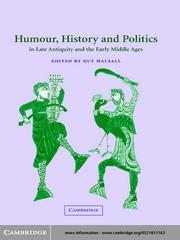| Listing 1 - 1 of 1 |
Sort by
|

ISBN: 1107125235 0521133653 0511157681 051149632X 0511120230 0511329792 1280159596 0511045107 0511020457 9780511020452 9780511045103 0511029802 9780511029806 9780511120237 9780521811163 0521811163 9780511496325 9781280159596 9780521133654 Year: 2002 Publisher: Cambridge New York Cambridge University Press
Abstract | Keywords | Export | Availability | Bookmark
 Loading...
Loading...Choose an application
- Reference Manager
- EndNote
- RefWorks (Direct export to RefWorks)
Although the topic of humour has been dealt with for other eras, early medieval humour remains largely neglected. These essays go some way towards filling the gap, examining how early medieval writers deliberately employed humour to make their cases. The essays range from the late Roman empire through to the tenth century, and from Byzantium to Anglo-Saxon England. The subject matter is diverse, but a number of themes link them together, notably the use of irony, ridicule and satire as political tools. Two chapters serve as an extended introduction to the topic, while the following six chapters offer varied treatments of humour and politics, looking at different times and places, but at the Carolingian world in particular. Together, they raise important and original issues about how humour was employed to articulate concepts of political power, perceptions of kingship, social relations and the role of particular texts.
Civilization, Medieval --- Classical wit and humor. --- Laughter in literature. --- Noncitizens in literature. --- Wit and humor, Classical --- Wit and humor, Ancient --- Medieval civilization --- Middle Ages --- Civilization --- Chivalry --- Renaissance --- History --- Europe --- Social conditions --- Aliens in literature. --- Aliens in literature --- Illegal aliens in literature --- Arts and Humanities --- Civilization, Medieval - Humor.
| Listing 1 - 1 of 1 |
Sort by
|

 Search
Search Feedback
Feedback About UniCat
About UniCat  Help
Help News
News